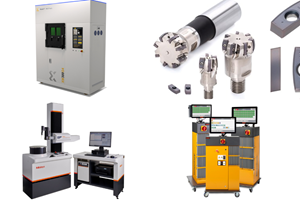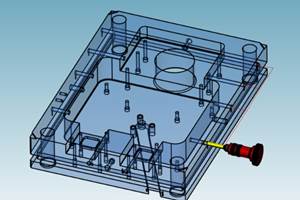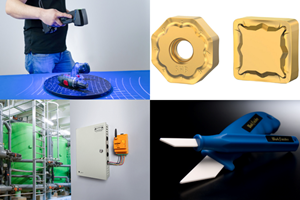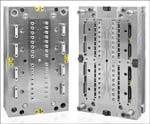RPM International Tool and Die: An International Force
Although not a U.S. company, this moldmaker faces similar challenges as its American counterparts while providing concept-to-completion services for countries around the world.
Twenty years ago, halfway around the world in New Zealand, two highly skilled toolmakers established RPM International Tool and Die—which provides concept-to-completion services including injection, die cast, blow and vacuum molds. This global company contends with many issues that American moldmakers face—training, technology, maintaining a skilled workforce, etc. Still, it has persevered and experienced rapid growth in large part due to its loyal long-term customers and its investment in its employees.
Additionally, the company’s quick delivery times and specialized expertise won them the job of developing the injection mold for the stadium seat for the 2004 Summer Olympics in Athens—completing the mold in 12 weeks. Their one-stop shop services include onsite mold sampling for plastic injection molds, mold flow analysis as well as mold inspection.
Opening Doors
In 1986, Peter Smith and Mark Vincent were both working at Northern Tools—a moldmaker specializing in plastic injection and blow molds—when they saw the need for a world-class moldmaking facility in New Zealand, and so RPM International Tool and Die opened its doors in a 1,000-square foot factory with the barest essentials in machinery.
They slowly grew the business to what it is today—gradually adding employees and making wise equipment purchases, such as its first CNC machine and a three-axis milling machine. They made sure to add supporting equipment like CAD/CAM and measuring equipment. Once this infrastructure was in place, adding additional CNC machines made sense and so they purchased (at the time) the largest three-axis, CNC milling machine dedicated to toolmaking in New Zealand.
A few years later, that purchase proved to be timely as it addressed the larger tooling market, which previously went offshore. So, they purchased high-precision, four-axis wire cut machines; high-speed, three-axis axis machining centers and a five-axis machining center. This enabled them to break into the international market in 1996, when they were contracted to produce cap tools for China, due to quality and cost issues. Initially, the company was contracted to manufacture a 16-cavity sports drink cap tool (the pull-out valve type).
“The Chinese owners were so impressed with the tools speed and product quality—something they weren’t able to achieve with tools produced in China—we were commissioned to make another three of the 16-cavity cap tool, all with spares that needed to be interchangeable and an additional 48-cavity over cap mold,” notes RPM General Manager Peter Smith.
RPM then expanded their market through Thailand and the U.S. Today, they are housed in a 30,000-square foot building with a staff of 52—officially dedicated by New Zealand’s Prime Minister Helen Clark in April of 2003. “Our rapid growth has been due to people—whether it is our commitment to customers (we still retain our very first customers), highly driven management, or the retention of our highly skilled, long-serving staff,” notes Smith. “We have more than 15 employees that have worked for us for more than 10 years.”
Smith notes that RPM is the largest privately owned and operated mold shop in New Zealand. “We have invested in tools, which allow us to be versatile,” he explains. “For example, by using PTC’s ProEngineer software, we can serve as a one-stop-shop for our customers—from product design and tool design to tool testing and initial production. All components are able to run in-house. We also have adopted PTC’s art-to-part philosophy to streamline work flow with some of our customers, but quickly realized this philosophy affords many benefits in reducing time and costs while improving quality. We are constantly searching for improvements in machinery, hardware, software and processes.”
Investing in Employees
Smith has stressed that his employees are the foundation of RPM’s success, and the company makes sure all of its employees have the know-how they need to get the job done—like PTC-certified training and apprentice training—in addition to studying lean manufacturing principles. “Our apprentices receive national qualification and our CAD/CAM users receive certificates at the end of their training,” Smith notes. “This training is required for them to perform their jobs. We also recognize that some employees wish to further improve themselves and would like to take extra courses (remote learning or night classes). In these situations we provide assistance in the form of study time—and in some cases—financial support.”
To keep staff on top of technology, Smith encourages them to participate in local user groups. RPM has four active members in the PTC Pro/Engineer Regional User Group (RUG) and also works with local suppliers to provide staff with regular product updates. For example, machinery and cutting tool suppliers call on the company regularly to present their latest technologies and answer questions derived from using their products on the shop floor. Additionally RPM’s staff is encouraged to attend the bi-annual trade show in Auckland—they receive paid leave to visit the show.
On a more personal level, RPM strives to keep its employees comfortable at work. “A large part of the design brief to the architects who where commissioned to build our facility was to ensure it is a pleasant, clean working environment, with a modern look and feel,” Smith explains. “We also worked hand in hand with the local council on a planting program, which has given us park-like gardens and grounds. We have a lunchroom we are proud of—containing a pool table, table tennis table and Internet access consoles.”
Keeping employees happy is an ongoing challenge, Smith acknowledges, and he relishes rising to the occasion. “We have discovered that cultivating an environment which encourages communication throughout the company has been beneficial. We hold regular meetings so that management and workers exchange thoughts and ideas. These meetings also give staff the feedback on how we are performing, which directly affects them as they are all a part of our profit sharing program.”
As another part of staff retention, the company recognizes the support given to employees from their families and encourages family participation at formal and social functions. “We have a very active social club, which is run by a committee made up of elected employees,” Smith notes. “Social club activities are fun activities, which have aided in team building—and as we financially support these activities—it is our way of thanking staff and their families.”
Finding New Talent
Another factor in the company’s longevity is seeking out new employees that have the skills RPM requires. Its apprenticeship program is committed to starting a new apprentice every six months. It is run in conjunction with Competenz (the New Zealand Engineering, Food and Manufacturing Industry Training Organization), which trains the apprentices through a national framework of national Unit Standards (also developed by Competenz), to maintain a consistent level and quality of expertise and exposure to complete range of skills necessary for the toolmaking trade.
“With taking on a new apprentice every six months, we have the resources to ensure all apprentices are rotated throughout the workshop—gaining valuable experience,” Smith states. “With each new section the apprentice moves to, the supervising tradesman changes, which also exposes the apprentice to a vast resource of toolmaking experience from the mix of national and international tradesmen they work beside.”
Smith adds that during the mid ‘90s RPM became disillusioned with the declining skill level of apprentices at the completion of their training, which prompted the company to become actively involved with the committee for developing and writing the national Unit Standards. Since then, the company has remained on the committee, which meets quarterly to assist in ensuring skill levels are maintained and current trends in technology are introduced.
Moving Forward
Currently RPM is involved in a variety of projects in many areas to ensure its long-term success—including a number of R&D projects from inventors and universities that Smith is not at liberty to discuss. In addition, Smith has just joined a government manufacturing committee studying international processes—in particular the Kaizen philosophy. The company also is working toward establishing even more of an international presence. “We need to overcome the geographical boundaries to international trade, which have hindered us due to our remote location,” Smith notes. “We will continue to increase our international exposure by travelling and attending international trade shows.”
Short- and long-term plans include continuing to implement lean manufacturing principles using the 20 Keys System (a Toyota production philosophy) developed by Iwao Kobayashi as well as guidelines from software provider PTC—which assists companies with delivering world-class products and services—allowing them to deal swiftly with emerging risks and opportunities. “We see PTC’s Product Life Management (PLM) tools as a way to differentiate ourselves and provide us with ways to shrink geographical distance and bring us closer to our customers,” Smith concludes. Since RPM is half a world away from most of its customers, this planning has been a crucial element to its current success and vital to its long-term viability.
Related Content
Products and Services for Multiple Moldmaking Needs
New year, new technology roundup! Featured here is a collection of product offerings, from profile milling cutters to industry-specific CAD/CAM software to innovative hot work tool steels.
Read MoreCAM Automation Increases Mold Production, Quality
Mold builder switches CAM software package after 20 years to take advantage of innovative programming strategies that reduce mold machining programming and processing times.
Read MoreNew Innovations in Mold Design, Milling Cutters, 3D Scanning
MoldMaking Technology compiles a number of digital-only products from the past month, including mold design software, laser metrology 3D scanners, milling cutters and more.
Read MoreHow to Select a Mold Temperature Controller
White paper shares how cooling channel analysis, which collects maximum pressure drop, total flow rate and heat dissipation, eases the performance evaluation of mold temperature controllers.
Read MoreRead Next
Understanding the Advantages Of U.S. Molds
The key to setting your shop’s direction toward the best targets is knowing one’s advantages when it comes to a U.S.-built mold.
Read MoreHow to Use Strategic Planning Tools, Data to Manage the Human Side of Business
Q&A with Marion Wells, MMT EAB member and founder of Human Asset Management.
Read More
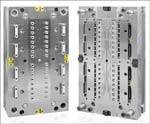













.jpg;maxWidth=300;quality=90)





